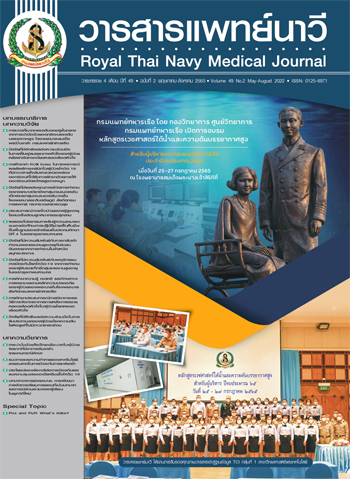ปัจจัยที่มีอิทธิพลต่อความร่วมมือในการรับประทานยาของผู้ป่วยโรคความดันโลหิตสูงที่ไม่มีภาวะแทรกซ้อน
Main Article Content
บทคัดย่อ
โรคความดันโลหิตสูงเป็นโรคไม่ติดต่อเรื้อรังซึ่งก่อให้เกิดโรคแทรกซ้อนที่อันตราย ความร่วมมือในการรับประทานยาเป็นสิ่งสำคัญที่จะช่วยป้องกันการเกิดภาวะแทรกซ้อน การศึกษาครั้งนี้เป็นการวิจัยเชิงทำนายเพื่อศึกษาความร่วมมือในการรับประทานยา และปัจจัยที่มีอิทธิพลต่อความร่วมมือในการรับประทานยาของผู้ป่วยโรคความดันโลหิตสูงที่ไม่มีภาวะแทรกซ้อน คัดเลือกกลุ่มตัวอย่างโดยการสุ่มตามช่วงเวลา ได้กลุ่มตัวอย่างจำนวน 97 ราย เครื่องมือที่ใช้ในการวิจัยประกอบด้วย แบบสอบถามข้อมูลทั่วไป แบบสอบถามความรอบรู้ด้านสุขภาพขั้นพื้นฐานเกี่ยวกับการรับประทานยา แบบสอบถามสัมพันธภาพระหว่างผู้ป่วยและบุคลากรทางการแพทย์ แบบสอบถามการรับรู้เกี่ยวกับโรคความดันโลหิตสูง แบบสอบถามการรับรู้สมรรถนะแห่งตนในการรับประทานยา และแบบสอบถามความร่วมมือในการรับประทานยา วิเคราะห์ข้อมูลด้วยสถิติพรรณนาและการวิเคราะห์ถดถอยพหุคูณ
ผลการศึกษา พบว่า กลุ่มตัวอย่างร้อยละ 40.2 มีความร่วมมือในการรับประทานยาอยู่ในระดับต่ำ (M = 5.95, SD = 1.664) ความรอบรู้ด้านสุขภาพ สัมพันธภาพระหว่างผู้ป่วยและบุคลากรทางการแพทย์ การรับรู้เกี่ยวกับโรคความดันโลหิตสูง และการรับรู้สมรรถนะแห่งตนในการรับประทานยา สามารถร่วมกันทำนายความร่วมมือในการรับประทานยาได้ร้อยละ 28.5 อย่างมีนัยสำคัญทางสถิติที่ระดับ .001 โดยพบว่า ความรอบรู้ด้านสุขภาพ และการรับรู้สมรรถนะแห่งตนในการรับประทานยามีอิทธิพลต่อความร่วมมือในการรับประทานยามากที่สุด (β = .24, p = <.05 และ β = .24, p = <.05 ตามลำดับ) รองลงมาคือ สัมพันธภาพระหว่างผู้ป่วยและบุคลากรทางการแพทย์ (β = .22, p = <.05) และการรับรู้เกี่ยวกับโรคความดันโลหิตสูง (β = .18, p = <.05)
ข้อเสนอแนะจากการศึกษาครั้งนี้ ควรจัดโปรแกรมเพื่อส่งเสริมความร่วมมือในการรับประทานยา โดยเน้นการรับรู้สมรรถนะแห่งตน ความรอบรู้ด้านสุขภาพ สร้างความตระหนักเกี่ยวกับการรับรู้เกี่ยวกับโรคความดันโลหิตสูง และส่งเสริมให้เกิดสัมพันธภาพที่ดีระหว่างผู้ป่วยและบุคคลากรทางการแพทย์ เพื่อให้ผู้ป่วยเห็นความสำคัญและเกิดความร่วมมือในการรับประทานยา
Article Details

อนุญาตภายใต้เงื่อนไข Creative Commons Attribution-NonCommercial-NoDerivatives 4.0 International License.
เอกสารอ้างอิง
World Health Organization. Hypertension. [Internet]. [cited 2019 March 5]. Available from: https://www.who.int/news-room/fact-sheets/detail/hypertension.
Zhang Y, Li X, Mao L, Zhang M, Li K, Zheng Y, et al. Factors affecting medication adherence in community-managed patients with hypertension based on the principal component analysis: evidence from Xinjiang, China. Dove Medical Press 2018;12(1):803-12.
Singh S, Shankar R, Singh GP. Prevalence and associated risk factors of hypertension: a cross-sectional study in Urban Varanasi. International Journal of Hypertension 2017;15(10):1-10.
Thai Hypertension Society. 2019 Thai guidelines on the treatment of hypertension. Bangkok: Trickthink; 2019. (in Thai).
Division of Non Communicable Disease. Hypertension: measure first, know first, can prevent. [Internet]. [cited 2019 March 5]. Available from: https://www.ddc.moph.go.th/
uploads/publish/962020191223152713.pdf. (in Thai).
Dzau VJ, Balatbat CA. Future of hypertension: the need for transformation. Hypertension 2019;74(3):450-7.
Sinsap N, Jankra J, Jaiman B. Hypertension is elderly: silence killer should be aware. Journal of Phrapokklao Nursing College 2017;28(1):100-9. (in Thai).
Thai Hypertension Society Hypertension in diabetic patients. [Internet]. [cited 2021 May 25]. Available from: http://www.thaihypertension.org/files/11.08Dec200618-AttachFile 1165550538.pdf. (in Thai).
Park S. Ideal target blood pressure in hypertension. Korean Circ J 2019;49(11):1002-9.
Asgedom SW, Atey TM, Desse TA. Antihypertensive medication adherence and associated factors among adult hypertensive patients at Jimma University Specialized Hospital, southwest Ethiopia. Biomed Central Research Notes 2018;11(1):1-8.
Boratas S, Kilic HF. Evaluation of medication adherence in hypertensive patients and influential factors. Pakistan Journal of Medical Sciences 2018;34(4):959-63.
World Health Organization. Adherence to long–term therapies evidence for action. Geneva World Health Organization; 2003.
Kim HJ, Yoon SJ, Oh IH, Lim JH, Kim YA. Medication adherence and the occurrence of complications in patients with newly diagnosed hypertension. Korean Circulation Journal 2016;46(3):384-93.
Mills KT, Bundy JD, Kelly TN, Reed JE, Kearney PM, Reynolds K, et al. Global disparities of hypertension prevalence and control: a systematic analysis of population-based studies from 90 countries. Circulation 2016;134(6):441-50.
Burnier M, Egan BM. Adherence in hypertension: a review of prevalence, risk factors, impact, and management. Circulation Research 2019;29(7):1124-40.
Vrijens B, Antoniou S, Burnier M, de la Sierra A, Volpe M. Current situation of medication adherence in hypertension. Frontiers in Pharmacology 2017;1(8):1-6.
Puengdokmai P, Charoenkitkarn V, Pinyopasakul W, Sriprasong S, Dumavibhat C. Factors influencing medication adherence in hypertensive patients without complications. Princess of Naradhiwas University Journal 2015;8(1):16-24. (in Thai).
Wangworatrakul W, Suwannaroop N, Moopayak K. Factors predicting to medication adherence among patients with essential hypertension. Journal of The Royal Thai Army Nurses 2017;18(1):131-8. (in Thai).
Sadoyoo S, Jirapreeya N, Treesak C, Sangjam P. Leftover medications in patients with chronic diseases from home health care visits: a community study in Bangkok. Dialogue on Pharmacy and Health Care Practice 2014;1(1):1-7. (in Thai).
Guerra AF, Rodriguez-Lopez L, Vargas-Ayala G, Huerta-Ramirez S, Serna DC, Lozano-Nuevo JJ. Depression increases the risk for uncontrolled hypertension. Experimental & Clinical Cardiology 2013;18(1):10-2.
Arindari DR, Jerayingmongkol P, Sanguanprasit B. Factors related to medication adherence among hypertensive patients in Muara Enim, Indonesia. Anpor Annual Conference 2015;12(1):3-7.
Lahkaew A, Chaleekroa T. Health literacy and factors related to medication among patients with hypertension, Ban Piang Luang sub-district health promoting hospital, Chiang Mai province. In: The 6th NEU National and International Conference 2019 (NEUNIC 2019): educational innovation for sustainable society development. July 20, 2019. Nouthestern University, Khon Kean. (in Thai).
Chipidza FE, Wallwork RS, Stern TA. Impact of the doctor-patient relationship. The Primary Care Companion for CNS Disorders 2015;17(5):15-8.
Murray B, McCrone S. An integrative review of promoting trust in the patient–primary care provider relationship. Journal of Advanced Nursing 2015;71(1):3-19.
Mahmoudian A, Zamani A, Tavakoli N, Farajzadegan Z, Fathollahi-Dehkordi F. Medication adherence in patients with hypertension: does satisfaction with doctor-patient relationship work?. Journal of research in medical sciences: the official. J Res Med Sci 2017;22:48. doi: 10.4103/jrms.JRMS_205_16. eCollection 2017.
Saleema L, Panpakdee O, Arpanantikul M, Chai-Aroon T. The influence of basic conditioning factors and self-care agency on self-care behaviors in Thais with hypertension. Pacific Rim Int J Nurs Res 2016;20(1):5-17.
Rusawang S. Factor related to polypharmacy medication adherence among older persons with chronic illness. Journal of Nursing, Siam University 2017;18(35):6-23. (in Thai).
Prakobchai S, Ayuthya SK, Wattanakitkrileart D, Buranakitjaroen P. Factors influencing medication-taking behavior of hypertensive patients. Nursing Science Journal of Thailand 2014;32(4):43-51. (in Thai).
Ellis PD. The essential guide to effect sizes: statistical power, meta-analysis, and the interpretation of research results. Cambridge University Press; 2010.
Chaiyata A, Numkhum L, Rakkapao N. The relationship between health literacy, medication intake, and doctor’s appointment behavior among patients with diabetes mellitus and hypertension in Lamphun province. Thai Science and Technology Journal 2020;28(1):182-93. (in Thai).
Kamsam A. Health belief and compliance behavior with prescribed medication among people with hypertension at Thakham District Health Promoting Hospital, Mueang district, Phrae province. [Master’s Thesis, Faculty of Public Health]. Chiang Mai University; 2015. (in Thai).
Ogedegbe G, Mancuso CA, Allegrante JP, Charlson ME. Development and evaluation of a medication adherence self-efficacy scale in hypertensive African-American patients. J Clin Epidemiol 2003;56(6):520-9.
Ruangthip T, Wattanakitkrileart D, Charoenkitkarn V, Dumavibhat C. Factors influencing medication adherence in patients with chronic heart failure. Royal Thai Navy Medical Journal 2017;44(4):51-63. (in Thai).
Thongma P. Health literacy and health outcomes in hypertensive patients. Thai Red Cross Nursing Journal 2020;13(1):50-62. (in Thai).

